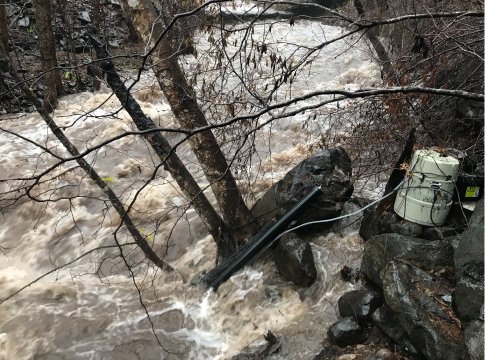Related News
Related News
-
EWEB Board of Commissioners selects BPA administrator for general manager role
In a unanimous vote, EWEB’s Board voted to move forward with negotiating an employment offer to BPA’s John Hairston.
Find Out More -
EWEB Board adopts 2026 organizational goals to guide utility priorities
At the January public meeting, EWEB adopted a new set of organizational goals for 2026, providing direction for our work priorities in the year ahead.
Find Out More -
Our Favorite Photos of 2025
For a final look-back at 2025, we’d like to share some of our favorite photos that illustrate our work day-in and day-out. We celebrate amazing teamwork, vital partnerships, and sing the praises of our individual champions and their quiet dedication to serving our community!
Find Out More -
EWEB Sets 2026 Budget and Rates, Advances Evaluation of McKenzie Valley Service Territory Realignment
Taken together, the 2026 budget and rate adjustments and the territory-realignment evaluation reflect EWEB’s dedication to responsible financial stewardship, modern, resilient utility infrastructure, and thoughtful planning for the future.
Find Out More -
Let's Talk Turkey. Is your family ready for winter?
We're heading into the holidays, but that also means snow, ice, and not-so-nice weather might be in the forecast. Here are some tips to prepare in advance.
Find Out More -
EWEB Hosts Annual Spill Drill to Protect McKenzie River
EWEB led emergency responders in its annual “spill drill” on the McKenzie River on Wednesday, Oct. 15, at the Trail Bridge Campground.
Find Out More -
A day in the life: Monitoring water quality throughout the McKenzie Watershed
Follow Senior Environmental Specialist David Donahue as he collects water quality samples from throughout the watershed as part of EWEB's early warning system for threats to Eugene's drinking water.
Find Out More -
EWEB Partners with Eugene School District 4J to Celebrate New Kennedy Middle School Emergency Water Station Site
Hundreds of attendees practiced filling up water containers at Saturday's demonstration event.
Find Out More -
Electric Projects underway in North & South Eugene
Underground lines and disaster-resilient power poles are part of EWEB’s infrastructure upgrade near Eugene’s largest natural resource area.
Find Out More -
Quartz Creek: Setting the Stage for Floodplain Restoration
The project resets the floodplain along 1.8 miles of a formerly channelized creek to improve water quality, fish habitat and natural disaster resiliency.
Find Out More -
Pure Water Partners: 5 Years of Regeneration
As EWEB and the Pure Water Partners observe the fifth anniversary of the Holiday Farm Fire, we celebrate major milestones in the watershed's recovery and check back in with PWP landowners who still have a lot of work ahead as they continue to rebuild their lives.
Find Out More -
Join the Pledge to Prepare
When you think about getting ready for an emergency, you probably have questions. You aren't alone. Preparing for emergencies can be overwhelming, which is why EWEB has put together a 12-month program to help you and your family get two weeks ready.
Find Out More -
You can’t predict the next disaster, but you can prepare
The earthquake lasted less than a minute. But now the power’s out. The tap runs dry. Cell service is spotty. Would you be ready?
Find Out More -
EWEB Celebrates Operators on the 75th Anniversary of the Hayden Bridge Filtration Plant
Learn more about the Water Treatment Plant Operators who have kept the Hayden Bridge Filtration Plant running for the last 75 years.
Find Out More -
NASA partners with EWEB to assess wildfire impacts to drinking water
NASA's Earth Information Center shares a new video detailing how EWEB's Drinking Water Source Protection work is advising new research tools
Find Out More - Show More
Enhanced Monitoring Key to a Healthy Watershed
February 11, 2021

On the heels of the Holiday Farm Fire, we quickly got to work with partner agencies and research organizations to identify post-fire threats to water quality in the McKenzie River. Additional water quality sensors have been placed in the main stem of the river, as well as in several creeks and tributaries. The widespread damage from the fire will likely threaten water quality for years, and these sensors are essential tools to the on-going recovery effort.
Real-time monitoring, especially during major storm events, provides important data about the location, amount, and types of contaminants flushed into the river. This information can act as an early warning system to adjust treatment practices at EWEB's filtration plant downstream and help prioritize watershed restoration activities. Learn more about watershed monitoring.
During the past few heavy rain events, monitors detected turbidity levels that were significantly higher than typical for the McKenzie River—a result of sediment from the surrounding land washing into the river. Analytical results from the expanded real-time monitoring network also showed an increase in nutrients, metals, and organic compounds coming from the burned and eroded landscape above the river.
Fortunately, these impacts seem to be short-lived and the water quality issues experienced so far are well within the capacity of EWEB's treatment plant to handle. Read more about your drinking water quality.
Protecting water quality requires a "source to tap" mentality, not simply relying on treatment measures to mitigate problems. The Holiday Farm Fire disaster presents an opportunity to rebuild smarter and strategically scale up source protection activities with an eye towards a more resilient watershed.
EWEB and our partners are looking for opportunities to implement large-scale floodplain restoration in key areas to mitigate flooding, erosion, and water quality impacts from severely burned landscapes. We also hope to work with area residents to replant some 100 acres of high priority riparian areas this winter.
If you are a landowner in the fire area and would like a site assessment from one of our team members, please visit the Pure Water Partners website.
Learn more about watershed restoration activities and protecting our water supply.

